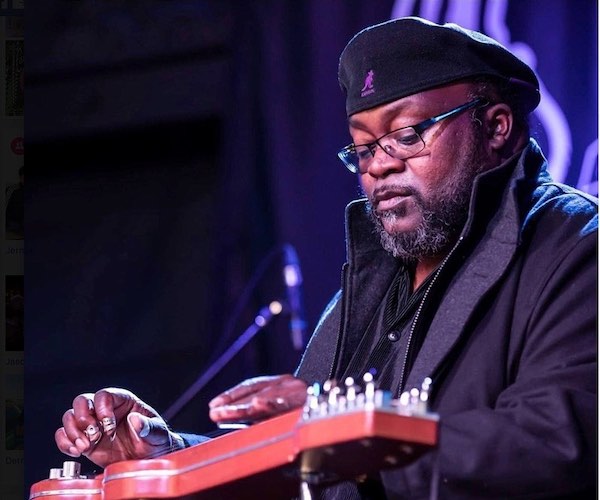Arts Remembrance: Darick Campbell — Quiet Giant of the Sacred Steel Guitar
By Noah Schaffer
Darick Campbell was one of the Campbell Brothers, the Rochester-based group whose emergence on the roots music circuit in the late ’90s played a major role in the mainstream discovery of the sound known as “sacred steel.”

The late lap steel guitarist Darick Campbell.
It befits the legacy of lap steel guitarist Darick Campbell that, while his playing influenced musicians around the world, finding the age at which he passed away this weekend proved to be elusive.
Campbell was one of the Campbell Brothers, the Rochester-based group whose emergence on the roots music circuit in the late ’90s played a major role in the mainstream discovery of the sound known as “sacred steel.” This fascinating but long hidden tradition, which dates back to the ’30s, was based in the Pentacostal House of God, Keith Dominion Church, where instead of a choir or organ gospel music was played on steel guitars.
In sacred steel, the slide guitar’s sustain echoes the deep passion of gospel vocalists, generating resonances that are both soulful and virtuosic. It’s such a distinctive sound that many of its secular fans remember the first time they heard it — in my case, when the Campbell Brothers appeared at the 1998 Lowell Folk Festival.
The group returned to the area for triumphant encores at Johnny D’s and the Museum of Fine Arts, while Darick popped up in side projects like the Slide Brothers and even the Experience Hendrix tour. When the Campbell Brothers broke out in the ’90s, it was as part of a wave of media attention that saw the release of multiple compilations on the Arhoolie label, a book and film (Sacred Steel) by Florida folklorist Robert Stone, and the crossover success of Robert Randolph. The Campbell Brothers managed to preserve their traditional sound while also discovering new creative avenues, such as their performances of John Coltrane’s “A Love Supreme.”
Darick Campbell started as a drummer before switching to the lap steel. (His brother Chuck handled the pedal steel guitar while Phil played electric guitar. Phil’s son Carl provided the driving beat.) An inevitable highlight of a Campbell Brothers concert was Darick’s star turn on “A Change Is Gonna Come,” where he would wring out every ounce of the pain and pride in the Sam Cooke song without a single lyric being sung.
Despite their acclaim, the Campbell Brothers have not had an easy road. While international festivals loved the band — they were slated to play at the New Orleans Jazz & Heritage Festival this month until COVID-19 got in the way — their religious message was a harder sell to nightclub owners who can provide artists with a year-round income. (When I booked the group for a concert in Worcester it was hard to find a date because of day job commitments.) And the brothers were booted out of the church their bishop father had founded — the acrimony yielded a messy lawsuit. After the mess was settled, the Campbells found themselves gospel stars without a church. They titled their last CD Beyond the Four Walls, and it was a fitting coda for Derek Campbell, whose remarkable playing was never destined to be kept a secret from the world.
Over the past 15 years Noah Schaffer has written about otherwise unheralded musicians from the worlds of gospel, jazz, blues, Latin, African, reggae, Middle Eastern music, klezmer, polka, and far beyond. He has won over 10 awards from the New England Newspaper and Press Association.
